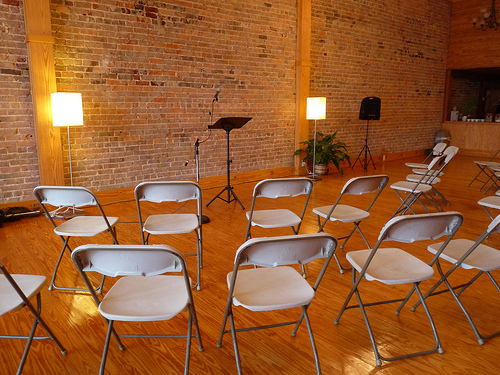 Fill those seats, and keep 'em happy. Photo by Christine Hennessey, The New Me.
Fill those seats, and keep 'em happy. Photo by Christine Hennessey, The New Me.
Literary hostess was not my aspiration.
Eager to promote the work of writer-friends, I simply organized a reading. “Don’t wait for the party,” I said, in an unusually zealous moment. “Be the party.”
But, I had attended enough readings — both as writer and reader — to know these events can be real snoozers. You know this is true. You’ve sat there, as I have, bored and annoyed, wondering why you chose this over an episode of Mad Men.
It turned out I actually enjoyed turning a typically staid event into a enjoyable, lively party. My first — an ensemble reading held at an art gallery — was so much fun I orchestrated another, and another. Ten years later, I’ve produced more than a dozen literary events, at a variety of venues. I’ve worked with writers of all stripes — fiction, nonfiction, memoir, poetry and song — from ages 8 to 80.
In my transition from shy-writer to party hostess, I’ve learned a great deal. Want to shine on stage? Try this:
Ten Tips to Giving a Good Reading
(that will make your audience happy, eager to buy books, see you again, and tell others about you)
1.
The stage is for acting — even, and especially — for writers. Not naturally stage savvy? No need to pretend. If writers were performers we’d bask in attention but instead we’re hunkered over keyboards, wearing sweatpants and day-old hair.
An actress-friend offered me this life-changing nugget: You have two selves, she said. The writer-you and the actor-you. When you create, you are deep in inner-writer world. But when you share your writing, you must go into outer-actor world. At a reading, take on a persona. Allow the actor-you to share the wonderful work of writer-you.
Sounds wacky, I know. But viewing a reading as a performance is especially helpful to introverted writers. This “performance” is not a departure from our real selves, but more of a removed perspective that allows the shy writer to step out with confidence.
2.
Don’t bore us to tears. You’ve got a time limit — stick to it. Organizers have invited you and carefully orchestrated the event’s pace and flow. Don’t assume your work is captivating enough to allow additional time (it isn’t), especially in a group event. Don’t be the guy who reads past the allotted time, then looks to the hostess and asks, “Do I have time for one more?” If you have to ask, you’re out of time. And while the host may acquiesce, she will seethe inside, and likely not invite you back, and may even talk poorly about you to others. (Yes, this is personal experience; I’m not bitter, just seasoned). Always leave the audience a bit hungry — and eager to buy your book.
3.
Give a bit of backstory. Purists will say “the work stands on its own” — meaning there’s no need for explanation. While it’s true you don’t want to beat the life out of your work with too much preamble, the audience has turned out to hear your words, from your mouth, in a live setting. Give us a glimpse of yourself. Let us in, let us like you.
4.
Smile. Everything is better with a smile. Sound Pollyanna? Try it! Seriously, a smile breaks resistance — yours and the audience’s. When your hands tremble and your voice quakes, relax your mouth, recall your best friend, and smile. The audience, says my actress friend, wants to like you. When you relax, your ease allows others to breathe a sigh of relief, too.
5.
Don’t mumble through your entire reading with eyes buried in your pages. We want to see your face, and feel a connection. In the throes of a mumbler, we wonder why we didn’t stay home and read your book in the comfort of our pjs. But now we’ve lost interest in your book. You’ve lost a sale.
6.
Be prepared. Why do writers, who have been invited as featured guests, show up to readings hapless and frazzled? From AWP to open mic nights, I’ve seen writers stumble to the podium with a look of dazed confusion as they page through reams of paper.
Note to Befuddled Writers At Public Readings: You’ve been invited. Don’t insult the audience with an attitude that broadcasts that you’re too busy, distracted or important to care about this event.
7.
Be kind — give thanks. From the multitude of writers longing for a stage, your host chose you. That’s no small thing. Literary events require planning, marketing, and varying degrees of mental, financial and emotional investment. Want to know what makes me happy? Appreciation from writers (also: glowing feedback from the audience).
After the reading, talk to people. Take time to thank those who support your efforts and promote your work. Be genuine, gracious and kind. Write your host a thank you note. It may seem old school but gratitude is timeless. And it’s true, what you give comes back to you.
Lastly, a few things that you probably already know, though some writers clearly don’t (trust me, this really happened):
8.
Don’t bring your husband and insist he have an opportunity to read from his book too. This isn’t Thriftway, no 2-for-1 deals.
9.
If attending a reading as an audience member, don’t bring your own books to sell. Sell your books at your reading, and/or your garage sale.
10.
Wear a clean shirt. You don’t have to go glam but please don’t show up in your garden grubbies. We get the hardworking-writer-vibe but, really, a clean sweater works wonders.
Okay, your turn. Got a reading story? A favorite tip? Spill it!
This piece was originally published on April 22, 2013 at Lisa Romeo Writes.






















